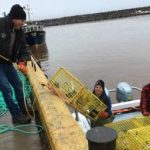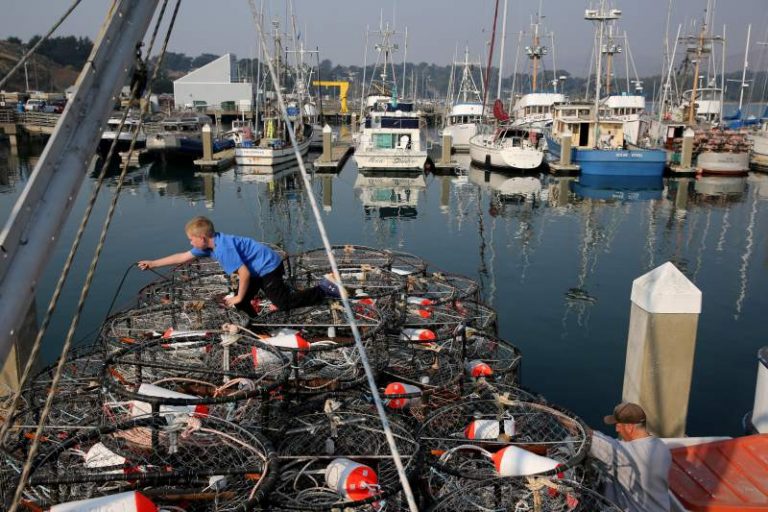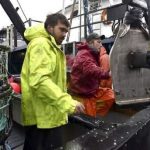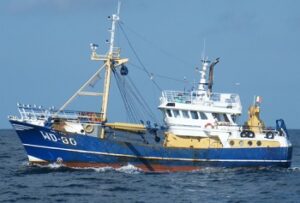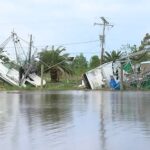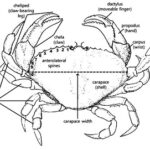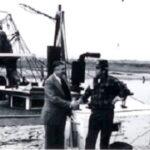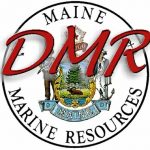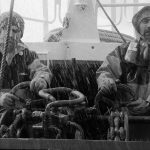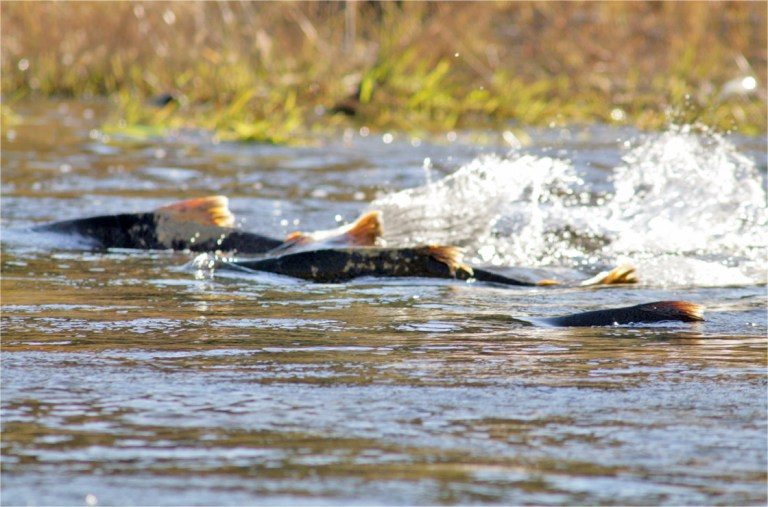Tag Archives: American Tunaboat Association
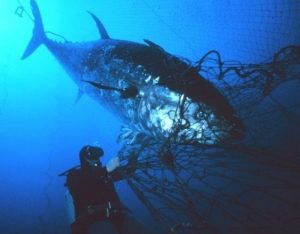
Tuna Fishermen Say Agencies Rejected Input on New Rules
Representing large net-fishing vessels in the Pacific Ocean, the American Tunaboat Association filed a lawsuit Wednesday claiming government fishery regulators left industry experts in the dark about a forthcoming biological opinion that could limit commercial tuna operations. The complaint, filed by Baker Botts attorney Megan Berge in Washington, D.C., federal court, names as defendants Commerce Secretary Wilbur Ross, the National Oceanic and Atmospheric Association and the National Marine Fisheries Service, or NMFS. >click to read<21:43
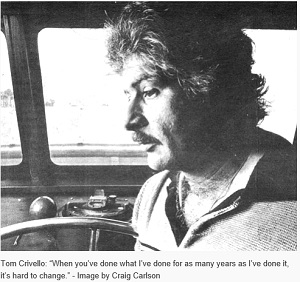
The fisherman and the government observer – Tuna by the ton: two tales of fishing
Tom Crivello is a tuna boat captain and owner of two large seiners, both of which carry helicopters that are used in hunting for tuna. Crivello’s two boats are the Rose Ann Marie, which is 220 feet long with a capacity of 1050 tons of fish, and the Marla Marie, which is 151 feet long and holds about 500 tons. They are both registered in the U.S. and are based in San Diego, along with about 125 other boats from the American tuna fleet of nearly 140 boats. About a year ago, after fishing for twenty-one years — since the age of sixteen — Crivello decided to retire and try to sell the Rose Ann Marie, which is valued at about five million dollars. He was feeling the effects of relentless pressure and he was determined to do something about it while he still was capable. Others had reached the limit, pressed on, and ended up with drinking problems or even nervous breakdowns. >click to read< 8 pages from May 13, 1982 18:35
US tuna boats seek level playing field
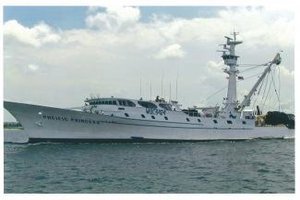 Going into next week’s meeting of the organization called the Western and Central Pacific fisheries Commission, aka Tuna Commission, the body which regulates the fishing of tuna in the Pacific Ocean, US tuna boats are hoping for better outcomes than what has been achieved in the best. The meeting takes place December 5-9 in Nadi, Fiji and American Samoa is sending several representatives. While much focus has been on the canneries and helping them stay competitive and keep them here, the tuna boats that deliver the fish which are processed and canned at the Starkist and Samoa Tuna Processors plants, have not received much attention. Regulations initiated by the Tuna Commission and the United States in recent years have hit the US tuna boats hard and subsequently affected the supply of fish for the local canneries. Read the story here 12:02
Going into next week’s meeting of the organization called the Western and Central Pacific fisheries Commission, aka Tuna Commission, the body which regulates the fishing of tuna in the Pacific Ocean, US tuna boats are hoping for better outcomes than what has been achieved in the best. The meeting takes place December 5-9 in Nadi, Fiji and American Samoa is sending several representatives. While much focus has been on the canneries and helping them stay competitive and keep them here, the tuna boats that deliver the fish which are processed and canned at the Starkist and Samoa Tuna Processors plants, have not received much attention. Regulations initiated by the Tuna Commission and the United States in recent years have hit the US tuna boats hard and subsequently affected the supply of fish for the local canneries. Read the story here 12:02
US Tuna Treaty survives, new deal for 2017 – Tunaboat Association comments on fishing pact
 The US Tuna Treaty has survived after 18 negotiation meetings over the last seven years, with the latest one just concluded in Auckland, New Zealand. The multilateral Treaty is important for American Samoa because it allows US puirse seiners that supply our two canneries to fish in the exclusive economic zones of island countries that are close by. Read the rest here Tunaboat Association comments on fishing pact – The President of the American Tunaboat Association, Brian Hallman, says the fishing agreement reached over the weekend in Zealand between the United States and Pacific Island countries is from the point of view of the US fleet, the best outcome they could have achieved under difficult circumstances. Read the rest here Tri Marine looks to build coalition – Tri Marine International, which operates the Samoa Tuna Processors cannery in Atuu, says it has been anticipating a change in how the US purse seiners would manage access to the tuna fishing grounds in the Western and Central Pacific for several years. Chief Operating Officer of Tri Marine, Joe Hamby, says now that the future of the US South Pacific Tuna Treaty has been resolved, “we will be able to focus on building a coalition of fishing companies and resource owners committed to supporting American Samoa as a regional tuna processing hub.” Read the rest here 19:55
The US Tuna Treaty has survived after 18 negotiation meetings over the last seven years, with the latest one just concluded in Auckland, New Zealand. The multilateral Treaty is important for American Samoa because it allows US puirse seiners that supply our two canneries to fish in the exclusive economic zones of island countries that are close by. Read the rest here Tunaboat Association comments on fishing pact – The President of the American Tunaboat Association, Brian Hallman, says the fishing agreement reached over the weekend in Zealand between the United States and Pacific Island countries is from the point of view of the US fleet, the best outcome they could have achieved under difficult circumstances. Read the rest here Tri Marine looks to build coalition – Tri Marine International, which operates the Samoa Tuna Processors cannery in Atuu, says it has been anticipating a change in how the US purse seiners would manage access to the tuna fishing grounds in the Western and Central Pacific for several years. Chief Operating Officer of Tri Marine, Joe Hamby, says now that the future of the US South Pacific Tuna Treaty has been resolved, “we will be able to focus on building a coalition of fishing companies and resource owners committed to supporting American Samoa as a regional tuna processing hub.” Read the rest here 19:55
Tri Marine disappointed with NMFS decision – Purse seiners will continue to fish but…
 The decision by the National Marine Fisheries Service not to issue an emergency rule to exempt purse seiners that deliver at least half of their catch to the local canneries from the ban on fishing in the high seas, puts fish supply for the canneries in jeopardy. In early statements Tri Marine said that locally based purse seiners would have to fish in waters close to Papua New Guinea and would find it uneconomical to travel all the way to Pago Pago to off load. Read the rest here, Meanwhile, The president of the American Tunaboat Association Brian Hallman says the ban on high seas fishing is very costly to US purse seiners, and while they will continue to fight on, at some point boat owners cannot continue to lose money and stay in business. Read the rest here 17:29
The decision by the National Marine Fisheries Service not to issue an emergency rule to exempt purse seiners that deliver at least half of their catch to the local canneries from the ban on fishing in the high seas, puts fish supply for the canneries in jeopardy. In early statements Tri Marine said that locally based purse seiners would have to fish in waters close to Papua New Guinea and would find it uneconomical to travel all the way to Pago Pago to off load. Read the rest here, Meanwhile, The president of the American Tunaboat Association Brian Hallman says the ban on high seas fishing is very costly to US purse seiners, and while they will continue to fight on, at some point boat owners cannot continue to lose money and stay in business. Read the rest here 17:29
Negotiations for new US tuna deal fail
 South Pacific Tuna Company executives have reported that parties failed to agree on a long-term renewal of the 1987 South Pacific Tuna Treaty, which provides US purse seine vessels access to the Western and Central Pacific Ocean fisheries. “We don’t know what the lack of a US Treaty arrangement will mean to the future of the US fleet, its processors who rely on our supply in Samoa, or the other canneries on the Mainland, our service providers and employees. Read the rest here 15:38
South Pacific Tuna Company executives have reported that parties failed to agree on a long-term renewal of the 1987 South Pacific Tuna Treaty, which provides US purse seine vessels access to the Western and Central Pacific Ocean fisheries. “We don’t know what the lack of a US Treaty arrangement will mean to the future of the US fleet, its processors who rely on our supply in Samoa, or the other canneries on the Mainland, our service providers and employees. Read the rest here 15:38
Optimism for deal to lower Pacific tuna catches
 Eight Pacific island nations, members of the Parties to the Nauru Agreement, along with Japan and the Philippines, want to reduce the catch of bigeye and yellow fin tuna over the next four years. But objections from the “distant water” fleets meant a modified proposal was now being worked on, said Brian Hallman, executive director of the American Tunaboat Association, which represents about 40 US-flagged purse seine fishing vessels. “At this stage, there is not a clear consensus on a solution which would be acceptable to all members,” Hallman said. more@phys.org 08:45
Eight Pacific island nations, members of the Parties to the Nauru Agreement, along with Japan and the Philippines, want to reduce the catch of bigeye and yellow fin tuna over the next four years. But objections from the “distant water” fleets meant a modified proposal was now being worked on, said Brian Hallman, executive director of the American Tunaboat Association, which represents about 40 US-flagged purse seine fishing vessels. “At this stage, there is not a clear consensus on a solution which would be acceptable to all members,” Hallman said. more@phys.org 08:45

































